Prestige, oil, China
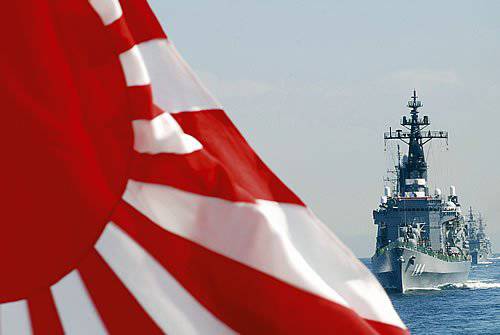 These and other motives encourage Japan to transform self-defense forces into a full-fledged army.
These and other motives encourage Japan to transform self-defense forces into a full-fledged army.For a long time after the end of World War II, Japanese national security policy was based on the doctrine of former Prime Minister Shigeru Yoshida, which provided for a substantial limitation of military expenditures and the strengthening of the alliance with the United States in order to accelerate the country's economic development under the American “nuclear umbrella”. In Japan today there are quite a few supporters of a further orientation towards the Yoshida doctrine and the maintenance of the existing status quo in relations with Washington.
However, from the beginning of the 1990's. The question of strengthening the Japanese Self-Defense Forces has become urgent. This was due to changes in the system of international relations as a result of the collapse of the USSR, increasing tensions on the Korean Peninsula, as well as the US desire to increase the role and responsibility of Japan in the framework of the American-Japanese alliance.
Today, Japan is actively involved in peacekeeping operations around the world. In addition, at the beginning of 2000's. Japan actively supported coalition forces operating in Afghanistan and Iraq. How did it happen that a country which, according to the Constitution, has no right to maintain armed forces, actively participates in UN peacekeeping operations and provides logistical support to the US and its allies during humanitarian operations in various parts of the world? On what conditions are the Japanese Self-Defense Forces involved in these operations, and what basic functions do they perform? And most importantly, what are the main objectives of the Japanese leadership, directing national units abroad?
THE CONSTITUTION OF JAPAN AND THE RIGHT TO SELF-DEFENSE
Created in 1954, the Self-Defense Forces have always avoided calling the army, bearing in mind the provisions of 9, the articles of the Constitution of Japan, precluding the possibility of possessing full-fledged armed forces with offensive potential. Therefore, formally, the Self-Defense Forces are a special civil organization that in reality performs the functions of the armed forces. Today, from a legal point of view, the existence of the Self-Defense Forces is interpreted by the Japanese leadership as the realization of each country's inalienable right to self-defense.
The Japanese Constitution does not regulate the question of the admissibility of the participation of Japanese national units in collective defense. The White Paper on Japan’s Defense for 2011 states that, according to the Constitution, the country has the right to the minimum necessary defense, the scope of which is determined on the basis of the current international situation. In addition, supporters of the expansion of Japan’s overseas presence often appeal to the provisions of the Preamble of the Japanese Constitution, which notes the desire of the Japanese people to “occupy an honorable place in the international community seeking to preserve peace and destroy tyranny and slavery, oppression and intolerance on Earth”. These provisions are interpreted as real and active participation in international cooperation in the fight against natural disasters, humanitarian disasters, the fight against terrorism, etc. At the same time, active participation is opposed to a closed existence - unarmed neutrality and inactive pacifism - in which the Japanese side only allocates funds to support the actions of the world community. This position was born under pressure from the United States, and under the influence of internal contradictions in the political elite of Japan.
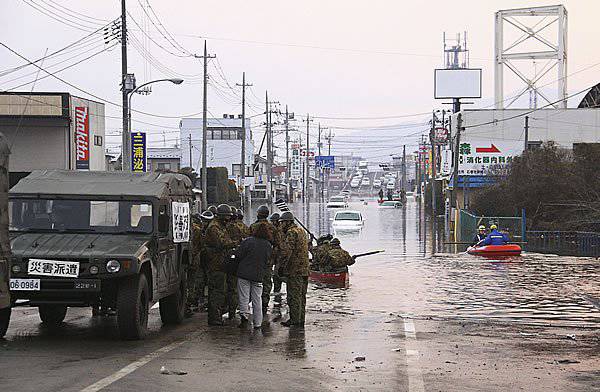
The laws that exist in Japan today already constitute a good base for supporting the foreign operations of the Self-Defense Forces. Formally, these laws do not contradict the national Constitution, since they do not recognize the right to use armed force and contain a number of other restrictions. It should also be noted that the first laws were passed with serious opposition from the opposition, and their adoption was largely associated with significant international events, such as the 11 September 2001 attacks in the United States. At the same time, the fact of the existence of such legislation, which is, in essence, a flexible interpretation of constitutional norms, testifies to the serious development of the defense policy of Japan and the expansion of the responsibility of the Self-Defense Forces over the course of 20 years.
These laws include: the Law on the Self-Defense Forces (No. 65 from 1954); Law on Cooperation with the UN Peacekeeping Forces (No. 79 of 1992); Law on Special Measures against Terror (No. 113 of 2001); The Law on Special Measures for Humanitarian and Recovery Assistance and Security Support in Iraq (No. 137 of 2003); Law on Special Technical Support Measures (No. 1 of 2008); The Anti-Piracy Measures Act (No. 55 from 2009).
GEOGRAPHY OF FOREIGN PRESENCE OF JAPAN FOR LAST 20 YEARS
In December, 2011 turned 20 years after the formal launch of Japanese operations abroad by the Japanese Self-Defense Forces: in December, the Japanese government sent a group of minesweepers to the Persian Gulf region, thereby contributing to the aftermath of the first Gulf War. .
Based on the provisions of the “Main Directions of the National Defense Program”, the current legislation of Japan, as well as its obligations to the United Nations and the United States, all operations of the Self-Defense Forces of recent times can be divided into several categories:
1. International cooperation in peacekeeping: peacekeeping operations (PKO); humanitarian missions; election observation missions.
2. Logistics and logistical support for coalition forces in Iraq and Afghanistan.
3. International cooperation to combat piracy.
In 1990's A contingent of the Self-Defense Forces of Japan was involved in missions and peacekeeping operations in Angola, Rwanda, Mozambique, the Golan Heights, and East Timor. His tasks included assisting refugees, transport services, carrying out reconstruction work, providing advice, and acting as observers.
In the first half of 2000's. the intensity of the foreign operations of the Japanese units increased sharply due to the accession of Japan to the anti-terrorist coalition. The September 11 2001 attacks in the United States served as a stimulus for Tokyo to make a decision to send the Japanese contingent to the Indian Ocean and Iraq to provide logistical and logistical assistance to coalition forces.
Operations in the Indian Ocean and Iraq have always stood apart from the general row of overseas missions of the Self-Defense Forces. The operation of the Japanese contingent in the Indian Ocean in support of the actions of the coalition forces in Afghanistan was carried out from November 2001 to January 2010. Its main task was to provide fuel for ships and aviation means of coalition forces, provision of transportation services. In addition, in the early 2000s. this list, in accordance with the "Basic Plan" of the operation, included medical services, repair work, as well as the supply of the necessary equipment, for which foreign ships were allowed to enter the ports of Japan.
The greatest resonance in Japanese political and public circles in connection with this operation caused the direction to the Indian Ocean as part of a group of national naval self-defense forces of the destroyer URO to participate in an escort of refueling vessels. The inclusion of this destroyer in the escort group of the country's government justified the need to ensure the effective protection of ship-refueling operators. However, experts believe that such a decision was made primarily to test the readiness of the Japanese public to take certain initiatives in the framework of foreign operations carried out by national formations, as well as to test the routes of the Japanese ships in the Indian Ocean.
The contingent of the Japan Ground Self-Defense Forces participated in a humanitarian mission in Iraq from 2004 to 2006. His tasks included the restoration of primary care centers, the training of medical personnel, the reconstruction of vital highways, and the supply of fresh water. The Japanese air units were in Iraq up to 2008 in accordance with the “Basic Plan” of the operation, performing the functions of transporting, as well as supplying their own and coalition ground forces.
The peculiarity of the Iraqi operation of the Self-Defense Forces of Japan was that, in fact, it was carried out in an area where the likelihood of a direct armed conflict was not excluded, which had a negative effect on the perception of this action by Japanese public opinion.
Today, the main areas of overseas Japanese operations have become the fight against piracy, participation in humanitarian missions and peacekeeping operations.
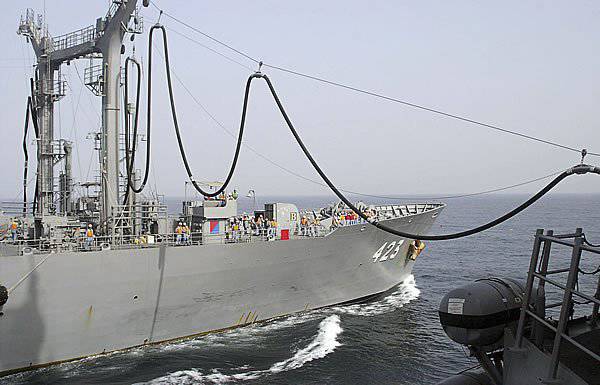
COOPERATION WITH UN FORCES TO MAINTAIN PEACE
The participation of the Japan Self-Defense Forces in peacekeeping operations under the auspices of the United Nations marked the beginning of their overseas presence. Currently, this area is the most actively developing and promising, due to the presence of an appropriate legal framework and the approval of the country's public. In addition, it contributes to maintaining a positive image of Japan in the world arena and strengthening its position in important regions of the world for Japanese foreign policy.
When conducting a PKO, the Self-Defense Forces are guided primarily by the Law on Cooperation with the UN peacekeeping forces adopted in 1992. The main idea of the Law is to expand the possible scope of the Self-Defense Forces (excluding participation in hostilities).
This law establishes 5 mandatory principles for the participation of the Japanese Self-Defense Forces in foreign operations:
1. The parties to the conflict on whose territory the PKO will be held have reached a cease-fire agreement.
2. Consent to the operation, as well as to the participation of Japan in it, was given by the country where the operation will be conducted, as well as by the parties to the conflict.
3. The basis of the PKO should be the principle of impartiality to the parties to the conflict.
4. In case of violation of any of the above conditions, the Parliament of Japan reserves the right to withdraw units of the Self-Defense Forces.
5. Armed force can be used only in cases of self-defense of personnel of Japanese units participating in the PKO.
The development of these principles has become, on the one hand, the necessary compromise for the political parties of Japan, and on the other, it has created the basis for the further development of legislative initiatives in the field of foreign operations. The most important of these principles are the conduct of a PKO in territories where no more military operations are conducted (a cease-fire agreement has been reached), and restrictions on the use of weapons.
In the period from 1992 to the present, the 26 order of various missions was carried out in cooperation with the UN, of which 17 - humanitarian operations and PKO. Japanese units took part in missions in Angola, Cambodia, Mozambique, El Salvador, Rwanda, the Golan Heights, East Timor, and Sudan. In addition, the Self-Defense Air Force was involved in the operations of transporting the Afghan and Iraqi refugees during the military actions of the multinational coalition in these countries.
The main functions of the Self-Defense Forces units in such operations were monitoring compliance with the cease-fire agreement, restoration work, providing advice to local police, technical coordination of transport operations, and providing medical and other assistance to refugees.
Such operations are related primarily to the civil sphere. Nevertheless, cooperation with units of other countries, the presence of observers from the Japanese Defense Ministry also implied the accumulation and exchange of experience in defense matters.
Operations in East Timor, Haiti, the Golan Heights are now in the active stage. In January 2012, the Japanese Self-Defense Forces also joined the peacekeeping operation and the provision of humanitarian assistance in South Sudan. The unit is located in Juba, the capital of South Sudan, and mainly performs engineering rehabilitation work.
Thus, cooperation with the UN in peacekeeping is constantly maintained by the Japanese side. Tokyo’s interest in such operations is due to the following factors:
- the desire to develop their Self-Defense Forces;
- the intention to demonstrate the activity of Japan as a member of the UN, which deserves to be included in the permanent membership of the Security Council;
- certain pressure from the United States to expand the scope of the Self-Defense Forces;
- the growing influence of China, including on the African continent.
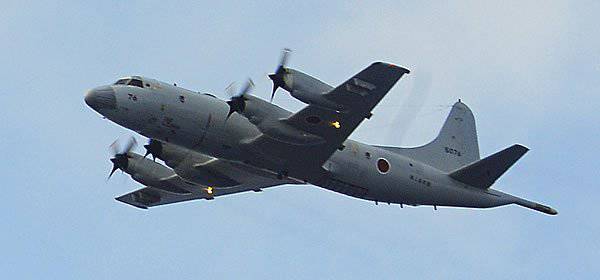
The importance of Africa for Japan is due, among other things, to the diversification of energy supplies after the Fukushima accident in March 2011. In this regard, it should be noted that the participation of Self-Defense Forces units in humanitarian missions and other foreign operations contributes to the establishment of economic ties international arena.
The current Cabinet of Ministers of Japan links the further development of the foreign activities of the Self-Defense Forces, including the easing of certain restrictions imposed by the Law on Cooperation with the UN peacekeeping forces. We are talking about a possible revision of the 5 principles mentioned above for the participation of Japanese units in the PKO with regard to the use of weapons. Changing legislation in the field of peacekeeping operations can help make the Japan Self-Defense Forces into full-fledged forces. However, in order to make such amendments to the current law, the government needs serious support in parliament, while disagreements on the country's political course still exist even within the ruling Democratic Party. Therefore, resolving the issue of expanding the responsibility of the Self-Defense Forces requires lengthy consultations and monitoring of public opinion, where pacifist sentiments are still very strong.
COUNTERACTION TO PIRACY IN THE ADENSKY BAY
Anti-piracy campaigns are not for the Self-Defense Forces something completely new. But the operation in the Gulf of Aden is different from other scale and remoteness of action from national borders.
Anti-piracy activities began in Japan back in 2000, when the first regional conference on countering piracy and seizing ships was held in the country. In its course, among other things, agreements were reached on holding joint exercises with India, Singapore, Malaysia, Brunei, the Philippines. On the Japanese side, Coast Guard units participated in these exercises. In addition, according to the agreement, foreign students were invited to the Japan Coast Guard Academy for internships.
At the beginning of the new millennium, the Japanese Coast Guard ships played a significantly more important role in ensuring security at sea, including in countering acts of piracy, than units of the Maritime Self-Defense Forces. They participated in the operation to expel the “spy” ship of North Korea from the territorial waters of Japan in December 2001, the conflicts around the Liancourt Islands, anti-piracy actions in the Malacca Strait.
Under national law, the Maritime Self-Defense Forces in this regard possessed much less rights and performed, rather, auxiliary functions. Then there was no need to create a legal base for their more active involvement in anti-piracy actions. However, the situation has changed with the exacerbation of the situation off the coast of Somalia in 2009. forming a new direction in the activities of the naval forces.
When deciding to send units of the Maritime Self-Defense Forces and Coast Guard units to the coast of Somalia, the Japanese government was guided by considerations to ensure the safety of maritime trade routes, including energy supplies, due to the geographical position of the country.
In his address to 19 on June 2009 on the occasion of the adoption of the Law on Measures to Counter Piracy, then-Prime Minister of Japan Taro Aso said: “The UN Security Council in a number of resolutions, including resolution No. 1816, called on states to send their naval vessels to the coast of Somalia and to the Gulf of Aden and take appropriate measures to counter acts of piracy. Many countries and organizations of Europe, North America and Asia responded to this appeal ... The Japanese government is also obliged to launch an anti-piracy operation off the coast of Somalia, based on the provisions of the new Law, as soon as possible. This is done, first of all, in order to ensure safety at sea in cooperation with the entire world community. ” The Prime Minister once again stressed that “in accordance with the new law, Japan will be able to protect not only Japanese sea vessels, but also vessels of other countries from pirate attacks. Under Japanese law, the act of piracy is a criminal offense and will be punished. Taken together, these provisions will make it possible to more effectively combat piracy in cooperation with all interested countries. ”
The first ships of the Japanese Self-Defense Forces appeared off the coast of Somalia in order to escort their merchant ships back in March, 2009. Then their actions were based on the provisions of the Law on Self-Defense Forces of 1954, which allowed escort operations. However, the full-scale joining of Japanese units to the multinational anti-piracy coalition in the area took place in June 2009, with the adoption of the law on counter-piracy measures.
As in many previous promotions, this operation is carried out in close cooperation with the United States. Within the framework of the American-Japanese alliance, a classification of anti-piracy mechanisms was developed, which was initially worked out in the Strait of Malacca, and then the accumulated experience was transferred to the Gulf of Aden. Possible mechanisms to combat piracy are divided into the following categories:
• protective equipment on board the ship (sirens, armed guards, etc.);
• naval security, which includes both escorts of national courts and the activities of the multinational patrol;
• regional anti-piracy patrol, which involves the interaction of multinational forces with countries located on the coast of the sea patrols;
• creation of an effective coast guard by the countries of the region.
In the case of the Gulf of Aden, participation in patrols meant the constant presence of units of the Japanese Maritime Self-Defense Forces off the coast of Somalia. That is why the first time the personnel of these units was located on the basis of the US Navy in Djibouti. At the beginning of 2010, the Japanese government decided to increase the participation of the Self-Defense Forces in the operation. In this regard, 23 April 2010 was followed by the announcement of the beginning of the arrangement of the base of the naval self-defense forces of Japan.
For a long time, the question of the Japanese overseas base remained open. The main reasons were the strong opposition within the country and the difficult situation of Japan after the natural and man-made disaster in March 2011. However, the opening of the base took place in Djibouti in early June last year.
This base, designed for 200 people staff, cost the Japanese side 4,7 billion yen ($ 58 million) and became the first permanent Japanese home base outside the country since the Second World War. The base was constructed on a plot of land leased from local authorities in 12 hectares. On it is built a hangar for maintenance of aircraft, barracks for personnel, a cafe and a sports hall. The new Japanese military facility is adjacent to the US air force base. In addition, two destroyers and two P-3C patrol aircraft of the Japan Self-Defense Forces are permanently based off the coast of Djibouti.
The Japanese command constantly emphasizes the need to strengthen the fight against pirates in the zone of the Gulf of Aden, where 20, thousands of sea cargo ships, are annually held. About 10% of them are Japanese tankers and bulk carriers, which are often subjected to pirate attacks. Therefore, the safety of these waters, according to the Japanese command, is of great importance for the country in terms of its national interests.
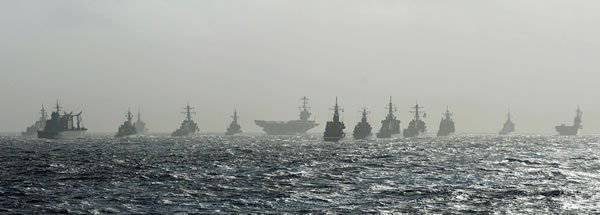
At the same time, skeptics among Japanese politicians and experts believe that the operation of the Maritime Self-Defense Forces in the Gulf of Aden should not be considered priority and important, since the real priority for them should be the defense of the Japanese archipelago. At the same time, attention is drawn to the fact that in the event of a real conflict in the APR and the overlap of the Strait of Malacca, the Japanese fleet will be cut off from the archipelago and will not be able to fulfill its main task.
Nevertheless, there are facts testifying to the significant changes in the nature of the military doctrine of Japan that have occurred recently, and the seriousness of intentions to build the capacity of the country's sea and air forces. One of the confirmations is the improvement of legislation, in accordance with which the operation is carried out in the Gulf of Aden, as well as the creation of the first foreign Japanese military base. The powers of the Self-Defense Forces units in foreign operations are gradually expanding. And if the amendments to the law on cooperation with the UN peacekeeping forces regarding the extension of powers to use weapons have not yet been adopted by the Self-Defense Forces, the Law on Measures Against Piracy already gives Japanese units the right to use weapons when other means of preventing pirate attacks exhausted. In addition, the operation in the Gulf of Aden is to some extent a continuation of the operations of the Self-Defense Forces in the Indian Ocean, which are extremely important for Japan.
To form a kind of holistic approach to foreign missions, the Japanese government took a long time. It was at the beginning of the 21st century that the plans for expanding the participation of the Self-Defense Forces in such operations developed the most favorable situation, since the active phase of the wars in Iraq and Afghanistan took place at that time and, as a result, the increased need for cooperation within the framework of the US-Japan military-political union. Foreign actions of the Self-Defense Forces were an indicator of the progressive development of Japanese defense policy.
So far, the role of foreign operations in the general context of Japan’s foreign policy is not so great and at the moment is to ensure an international presence, create a positive image of a peacemaker, and ensure the country's energy security.
At the same time, despite the adoption of a number of legislative initiatives in the development of the Self-Defense Forces in previous 20 years, today the situation remains when the Japanese government has to act in the new international environment according to the old "rules of the game." The increasing sharpness of this contradiction requires the Yoshihiko Noda Cabinet to take some steps to change the outdated, as it seems, “rules”. The first such change was the revision of the principles of arms exports in December 2011, which opened the way for the development of military-technical cooperation of Japan with the countries of NATO, Australia and South Korea. In the future, the expansion of the powers of the Self-Defense Forces on the use of weapons during foreign operations, as well as their conversion into full-fledged aircraft, is not excluded. In particular, the development of the Self-Defense Forces’s positive perception by the Japanese public is contributing to this development. Such data are reflected in the latest public opinion poll conducted by the Ministry of Defense of Japan and published in March 2012. All this indicates that over time Japan can become a full-fledged military power.
At present, the geography of the use of units of the Japanese Self-Defense Forces coincides with the general trends of Tokyo’s regional and global security policy. Important factors influencing this policy are the concerns of both Japan and the United States and a number of other countries about the growing influence of China, as well as the desire of the Japanese leadership to achieve a higher position of the country in international organizations, to ensure its energy security. Thus, the general context of Japan’s policy contributes to the revitalization of its power component, which is likely to be reflected in future foreign operations of the Self-Defense Forces.
Information